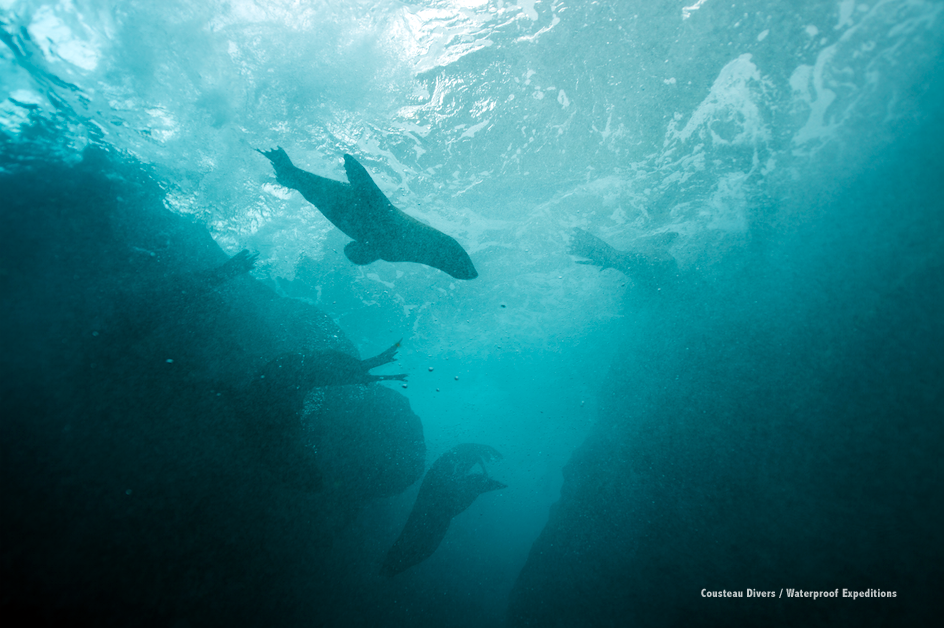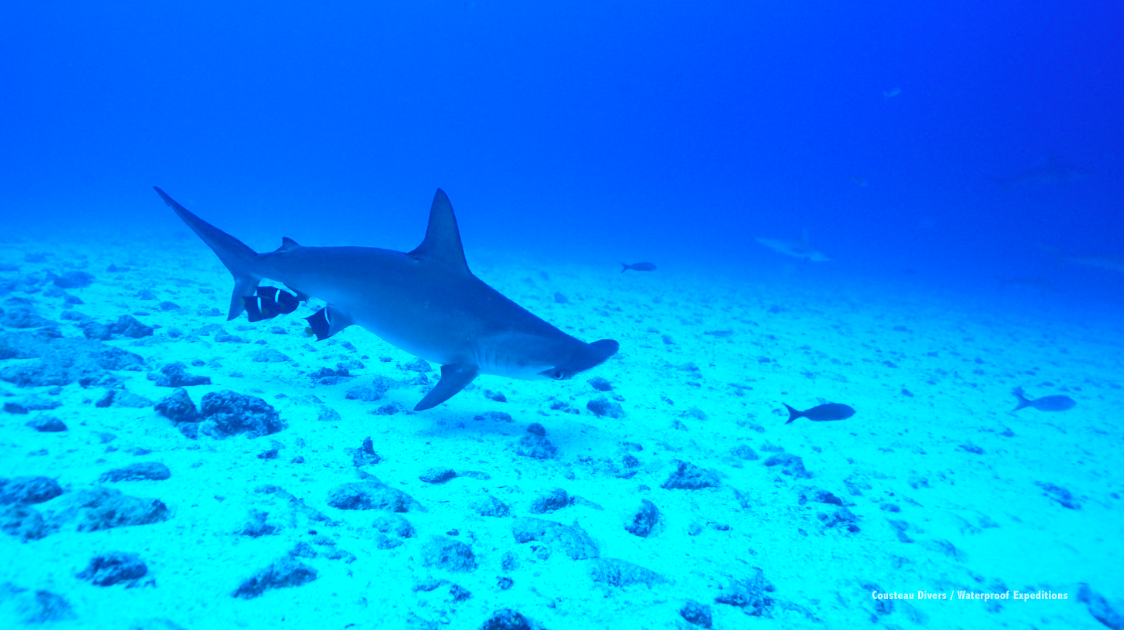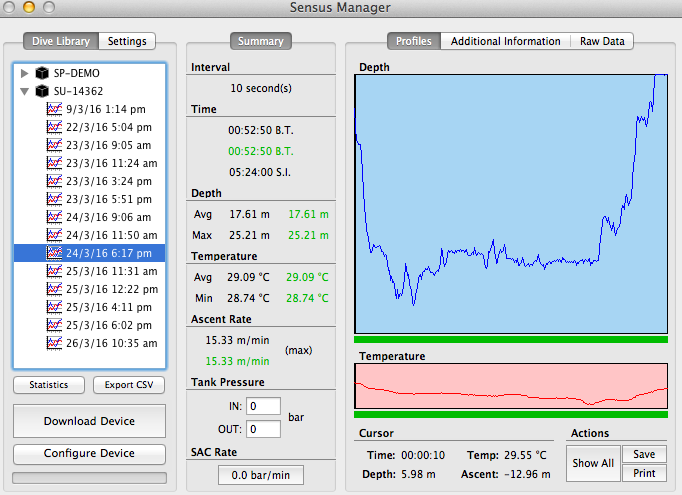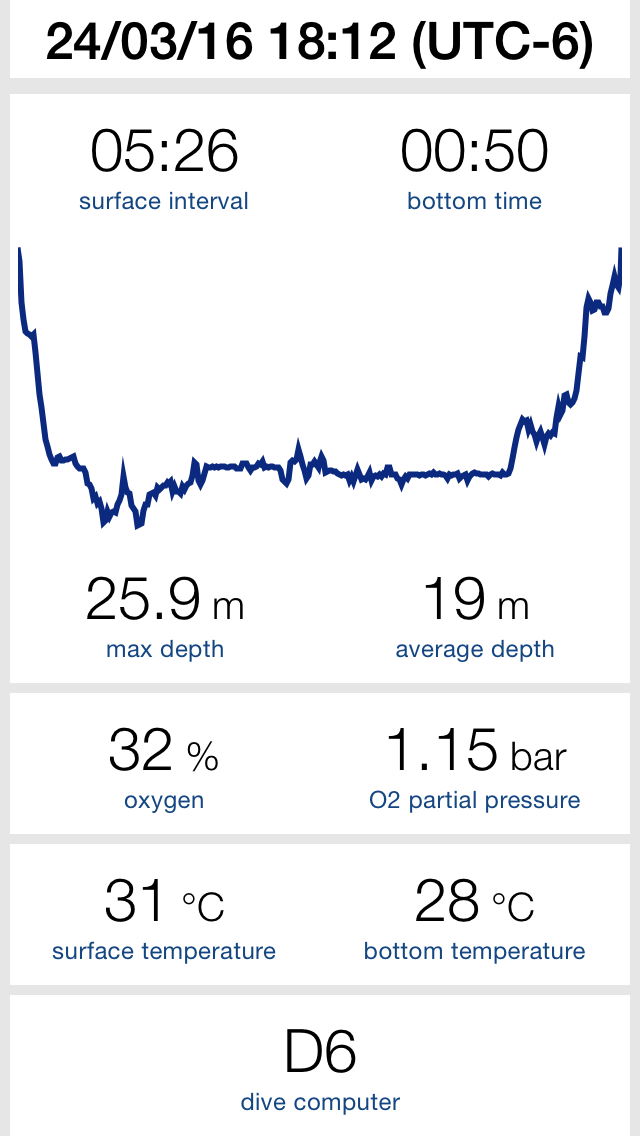Marine Life & Conservation
Pierre-Yves Cousteau’s Galapagos: Dive into the Wild
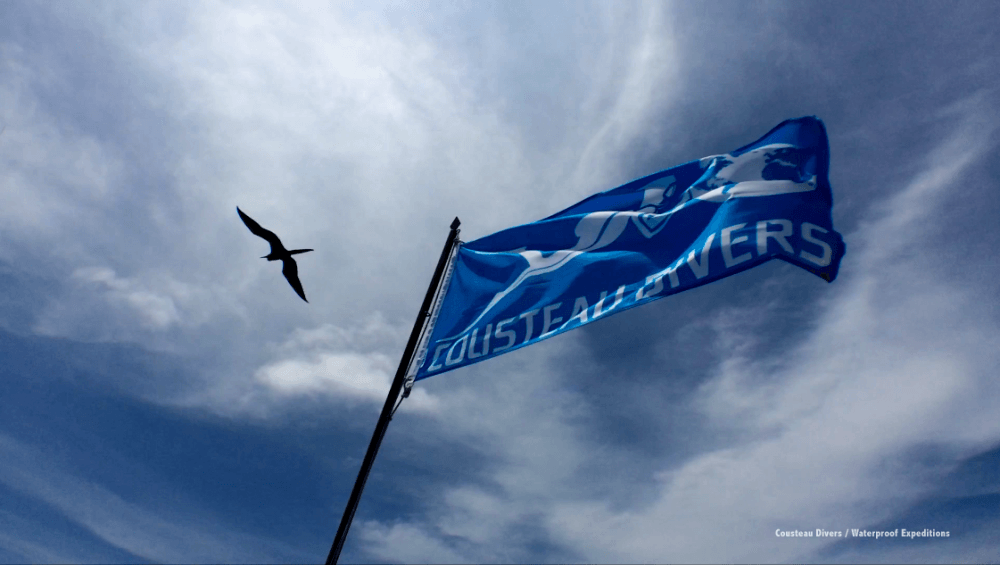
Read Part 1 of Pierre-Yves’ Galapagos blog here.
Ocean, how I missed you.
Wild and free, alive. Still full of promise, mystery and surprise.
A blood moon rises as the Galapagos Sky sets sail to explore the coastal waters of the Galapagos Islands. A variety of passengers, both in nationality and profession, further adds to the rich diversity of the trip. A New-Zealand farmer, a British administrative employee, a Dutch software designer and tester couple, an Indian real-estate developer, a Swiss family, Steve and I… The crew, with their dedication and skill, are the essential ingredient that makes the trip successful. I notice with pleasure that the Galapagos Sky has been “tagged” by my friend Wyland with a beautiful hammerhead mural.
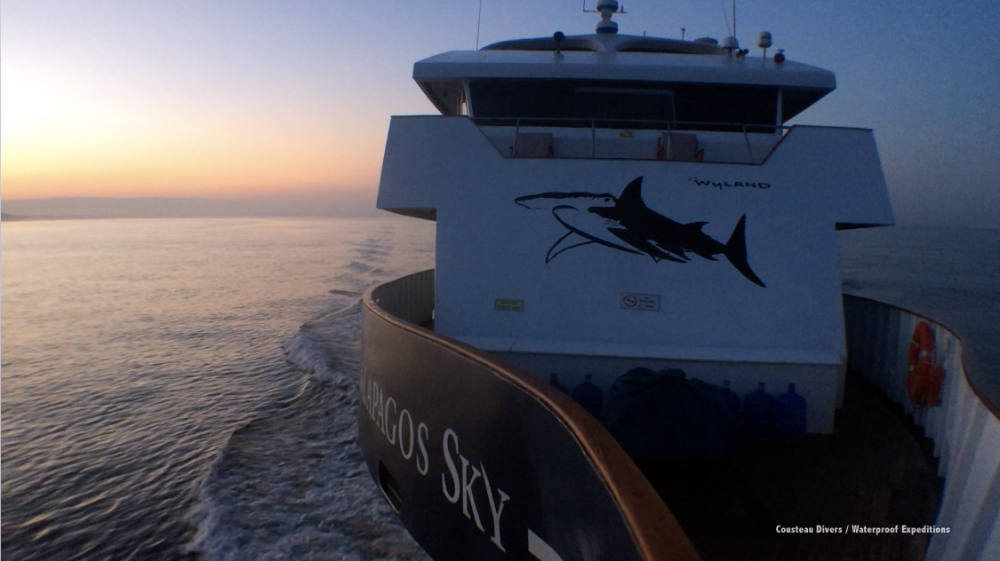
The diving conditions are exceptional. As in exception. Our guides have never had waters so warm, or currents so strong. In principle, neither is a good sign for observing marine life. As the water warms and the thermocline dives deeper, fish who prefer cooler waters stay out of sight. Strong currents mean we had to shoot images using one hand, the other one being busy holding on for dear life to a rock.
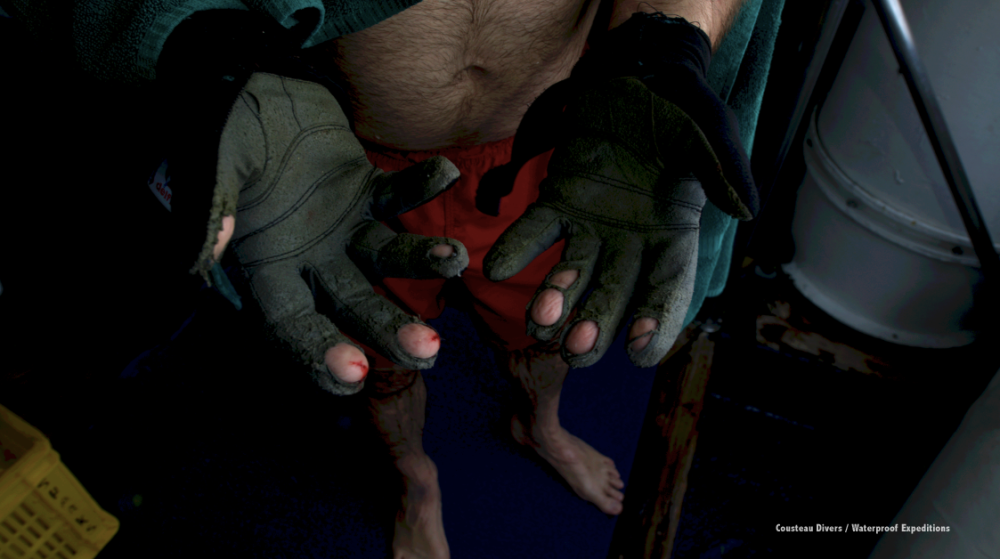
As we dive into another world, we become the invisible witnesses of millions of lives. We enter a universe we still know very little about. We fly among creatures without being able to hear their language. Territory, predation, cooperation, social behavior… We see only what is manifest, when countless unseen codes and gambits are played out in silence. Confused by our bubbly presence, the animals chose to ignore us. They are entirely absorbed in the necessities of every moment, and curiosity is a luxury that few can afford.
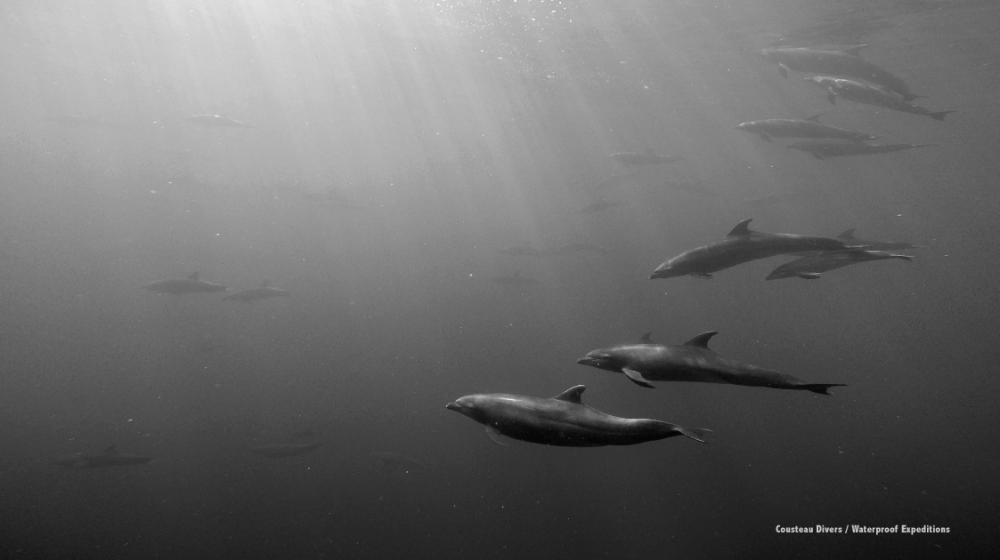

Coming up from one dive Steve and I find ourselves a bit far from the rest of the group, after filming sharks. The sun is setting and the dingy is quite far away, collecting other divers. I am suddenly reminded of our status as strangers in this wilderness. Dangling at the surface above hundreds of sharks I think: we’re perfect prey! I immediately put on my mask and peer down into the thick, dark waters. Just at that moment, a silky shark bolts up from the deep to examine us. After a rapid assessment, it dives back down into the dark blue. Steve and I take turns looking down and hailing the dingy until they pick us up.
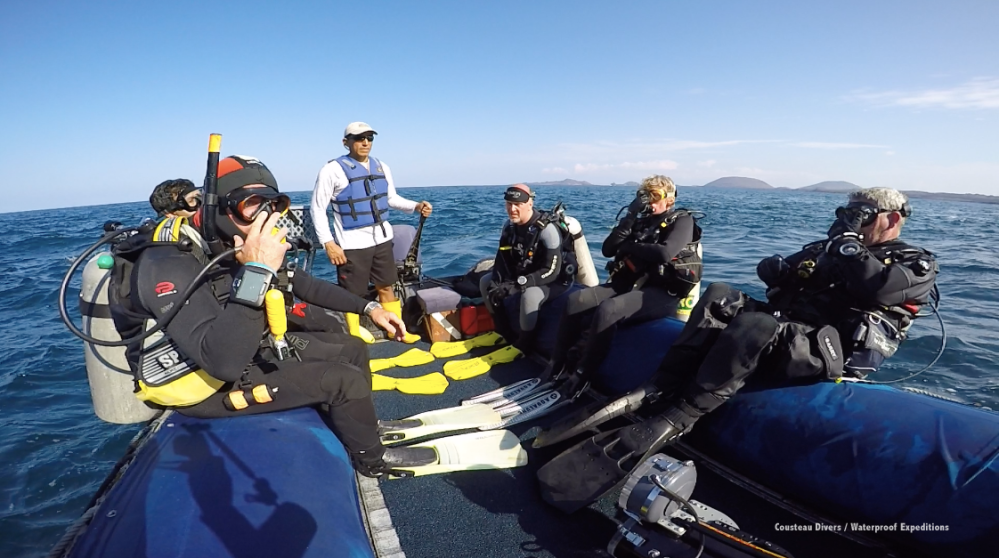
Returning to the Galapagos Sky I am struck by the presence of a dozen dead birds floating around us, their corpses apparently intact. Of the thousands of birds who constantly circle the Island of Darwin, I wonder if this is a natural “skimming” of the weak by competition or by disease. Our guide Jeff explains that these birds have starved or drowned because the thermocline is too deep, and the surface waters are too warm, meaning that the natural prey of these birds have dived deeper than they can reach. (Those familiar with my father’s movies will notice a certain physical resemblance between Jeff and Falco).
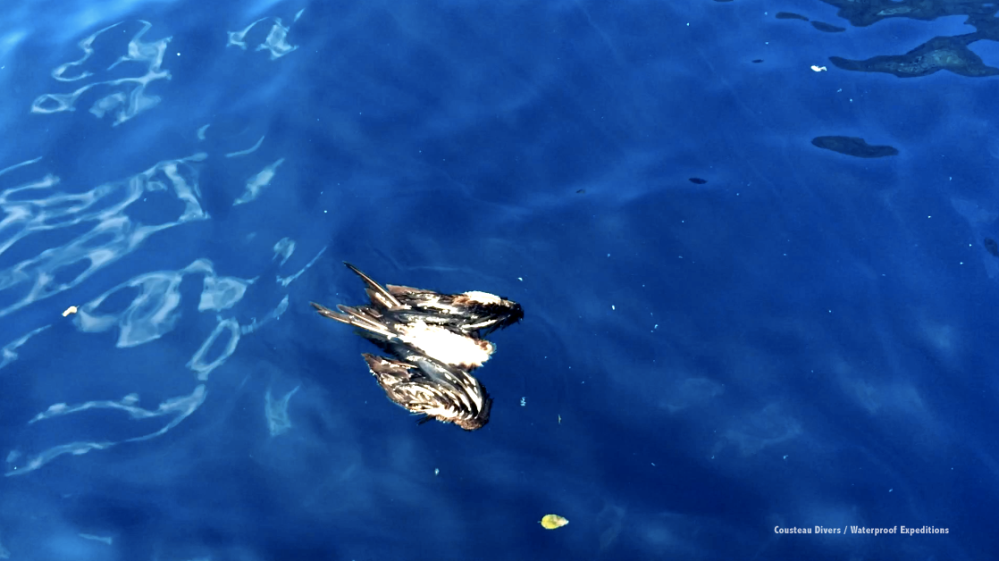
As part of Project Hermes, I’ve been diving with the Sensus Ultra, whose accuracy was tested in the Australian waters of Heron Island by the University of Queensland’s Global Change Institute team. Dive profiles were also recorded from our dive computers. The surface temperatures were a most comfortable and exceptionally warm, 30 degrees Celsius on most dive sites, with often no thermocline down to 30 meters depth. Speaking with Jeff and Max our dive guides of the Galapagos Sky, they’ve never had surface waters so warm.
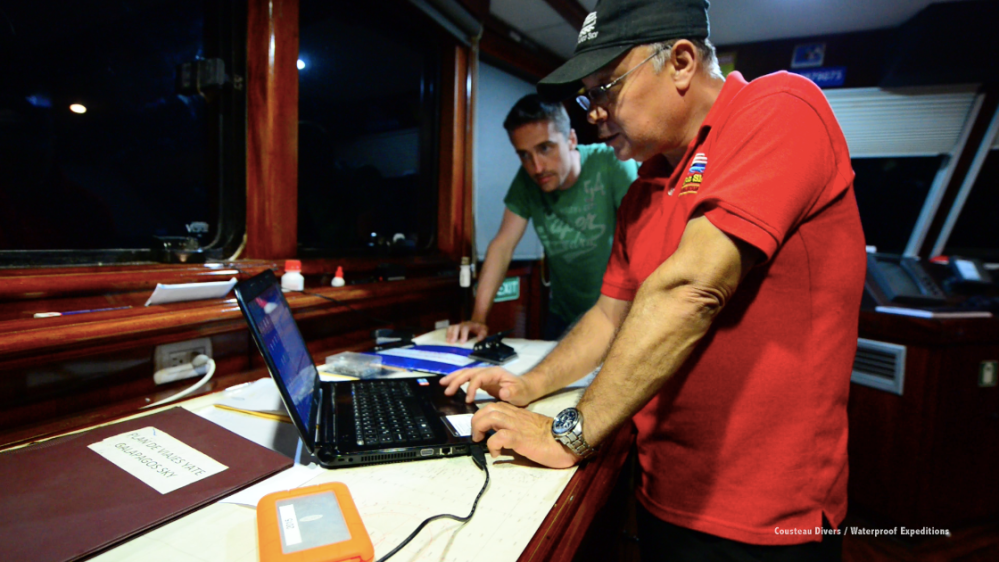
In 2016, you have to travel far in order to witness the miracles of nature in its untamed wilderness. As far as possible from the mega-cities and industrial sprawls. Far from the madness of men and women who constantly obsess about growth, greed and domination. How the underwater world has degraded since the days my father revealed it with his movies… Clearly the situation would be worse if he hadn’t, but also clearly his efforts were insufficient to prevent the decline entirely. Raising awareness can only go so far. For the next expedition to Tahiti with Waterproof Expeditions, in July 2017, I will spend more time searching the Cousteau archives in an attempt to produce before / after visuals as a testimony.
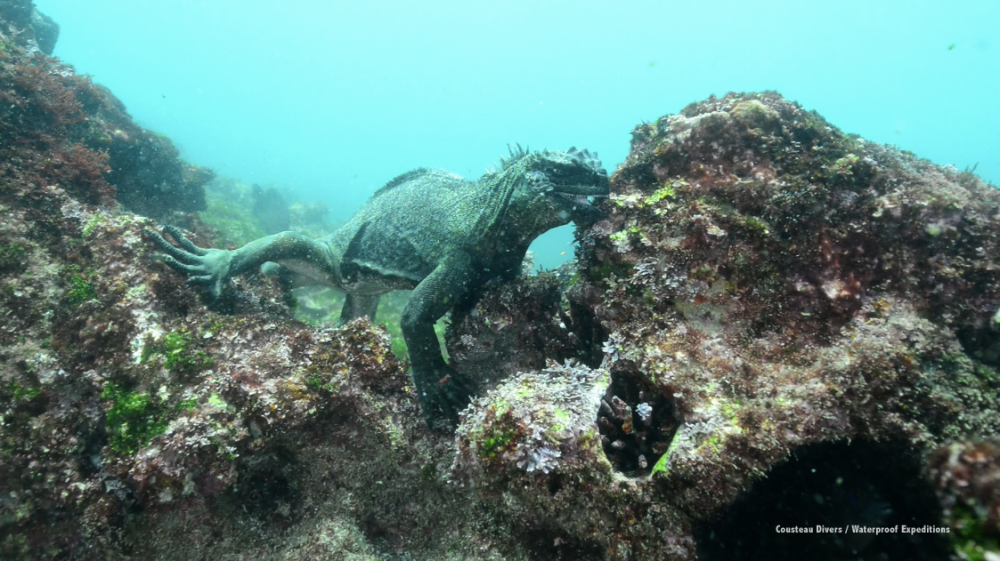
Climate change, habitat degradation, overfishing, plastic pollution… the list of our inconsiderate squandering of the ocean is long, and the Galapagos seem to have been successfully sheltered from these plagues so far. In fact I was delighted to note that I did not encounter a single piece of trash of any size during the week at sea: something I cannot say of any other place I have been in the world. Our guides explain that the National Park has very strict rules for disposal of trash in general and plastic in particular, with efficient collection mechanisms. However, I was saddened to learn that most of the plastic ends up in a landfill, here in the Galapagos. At least the collection is good. Recycling and disposal would be better. An absolute ban on single-use plastics, worldwide, but here in particular, seems necessary.
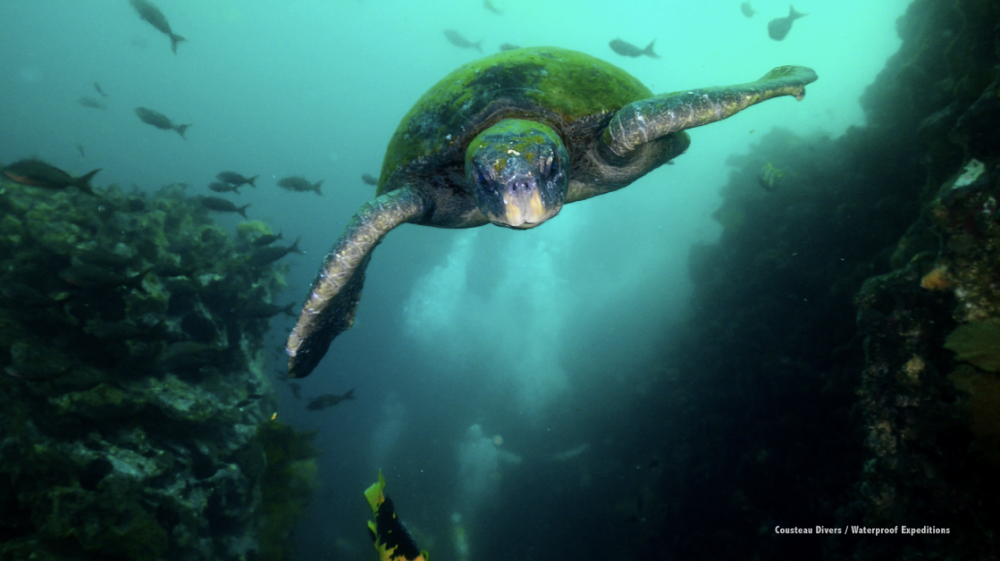
I’ve always wondered if there was a common cause for all this blind destruction. It seems to me that the reason is embedded in our minds: a lack of foresight and understanding of the real costs of our actions. What is referred to in business as “externalities”. I am convinced that sustainable development is possible, but it requires far more brainpower than is currently being used. More innovation, more research, and a shift in subsidies. So why don’t we turn our mind’s eye towards achieving it?
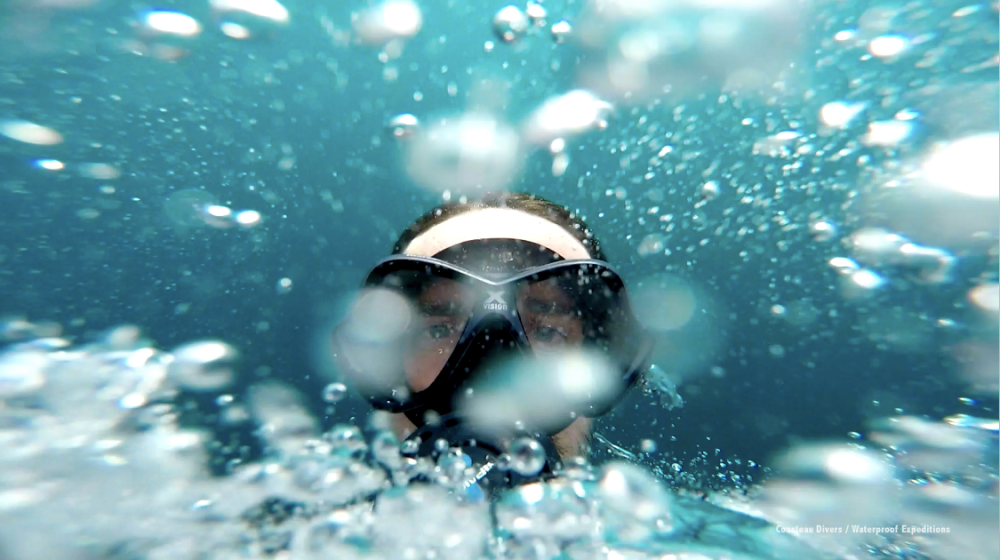
In a recent piece of work I did for IUCN, people were consulted across Europe to identify the main barriers to achieving sustainable development for the sea. Awareness and education came out on top as the most powerful ways to overcome those barriers. However, the social ecosystem itself appeared to be the main blockage in converting that awareness into action. The cultural values and cognitive frameworks that infuse our contemporary societies are diametrically opposite to the ones that would foster environmental stewardship. The obsessions with financial success and personal image prevent us from making the sustainable decision when given equivalent choices.
But how can you appeal to moral duty and self-transcendence when people are struggling to make ends meet, and constantly terrorized by the media into avid conformity? Social sciences are the missing piece of the puzzle for conservation and sustainable development to steer the Titanic of our civilization, and as the environment degrades, so do the options for living outside of the “rat race”. A vicious cycle. We must bring people into the equation of conserving natural resources by appealing to intrinsic values and calling for a transparent examination of the values that we are constantly being bombarded with, mostly by mainstream media and advertisement.
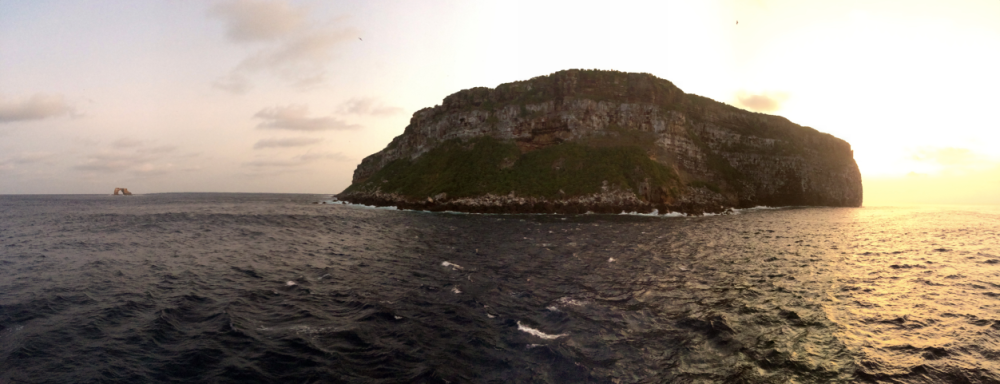
The information I had received prior to my previous blog post was true: the islands of Wolf and Darwin have been given no-take status by the president of Ecuador. This is fantastic news for marine life in these exceptional sites. But it seems the people, the few local fishermen who have always practiced small-scale traditional fishing in that area, were not considered in this process. They demand some kind of compensation, or right to fish in a reduced area between the two islands. In such a remote place, where daily enforcement is practically impossible, it would seem wise to at least consult, if not actively engage the fishermen in the establishment of the protected area. Once again, social sciences have been left aside, and the consequences for the success of the protection remain to be seen. I have interviewed the mayor of San Cristobal and the local fishermen during my time here and will give more detail on this in the next post.
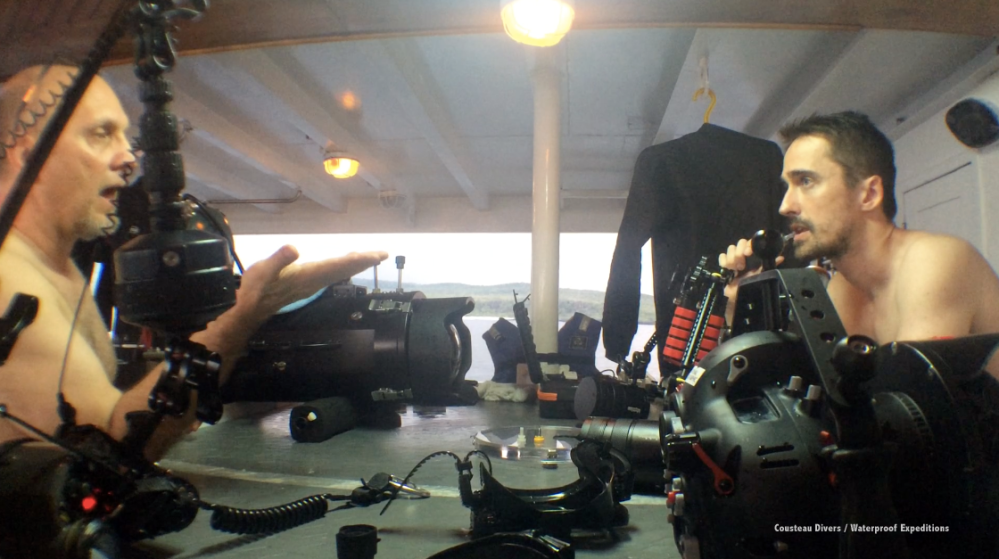
All the images you see here are screenshots from the videos I have been filming. The Big Blue lights have proven to be amazing and incredibly durable. I have not yet managed to cycle through the battery entirely, even by leaving them turned on for two consecutive dives. Next week I will try to shoot some good stills, but I’ve been having some technical problems with my strobes. They fire optically and the housing I have for the camera has an in-built electrical system, which I had no time to replace before the trip. So I use an electrical to optical converter, and that has proven to be a nightmare… firing rather randomly. I plan on piecing together the videos into a mini-documentary for the web, featuring some of Steve’s exceptional high-speed footage. Stay tuned.
~ Pierre-Yves Cousteau
www.waterproof-expeditions.com
For more blogs from Pierre-Yves Cousteau, visit cousteaudivers.wordpress.com.
Marine Life & Conservation
Paul Watson Released as Denmark Blocks Japan’s Extradition Bid

Renowned anti-whaling activist Paul Watson has been released from custody in Greenland after spending five months in detention. Denmark’s Justice Ministry rejected Japan’s request for his extradition, citing insufficient guarantees that his time already served in custody would be credited against any potential sentence.
The 74-year-old Canadian-American was arrested on July 21 in Nuuk, Greenland’s capital, when his ship docked to refuel. His arrest was based on a 2012 Japanese warrant related to a 2010 encounter in Antarctic waters. Japan alleged Watson obstructed operations and caused damage to a whaling research ship during efforts to disrupt illegal whaling. Watson has consistently denied these claims, maintaining his commitment to marine conservation.
Denmark, which oversees extradition matters for Greenland, concluded that while the legal conditions for extradition were met, the lack of assurances from Japan regarding time-served credit made extradition untenable.
In a video shared by his foundation, Watson expressed gratitude and relief, saying, “After five months, it’s good to be out… and good to know they’re not sending me to Japan.” He added that the most difficult part of his time in custody was being separated from his two young sons.
Watson is a pioneering figure in marine conservation, known for founding the Captain Paul Watson Foundation in 2022 after decades of activism with the Sea Shepherd Conservation Society. His bold efforts to defend marine life have earned him widespread support, including from celebrities and conservationists. His work has also been featured in the acclaimed reality TV series Whale Wars.
Watson’s lawyer, Jonas Christoffersen, praised the decision, stating, “We are happy and relieved that Paul Watson is now free.” He added that Watson is eager to reunite with his family and continue his vital work.
The arrest occurred while Watson’s vessel, the M/Y John Paul DeJoria, was en route to the North Pacific with a team of 26 volunteers to intercept a Japanese whaling ship. His foundation described the arrest as politically motivated and emphasized that Watson’s actions were focused on ending illegal whaling practices.
Japan resumed commercial whaling in 2019 after leaving the International Whaling Commission, asserting that whale meat is a cultural tradition. Conservationists, however, continue to challenge these practices, highlighting their impact on marine ecosystems.
Despite the challenges, Watson remains steadfast in his mission to protect marine life and bring attention to whaling practices. His dedication to ocean conservation has made him a globally respected advocate for the environment.
Marine Life & Conservation
12 Days of Zero-Waste Fish-mas

This holiday period, the Marine Conservation Society, the UK’s leading ocean membership charity, invites you to make some simple changes to eating fish this Christmas to help our seas.
Dr Kenneth Bodles, Head of Fisheries and Aquaculture at the Marine Conservation Society, said, “During the festive season, our consumption increases, but so does waste. Sustainability isn’t just about where food comes from – it’s also about how you use it. By reducing waste and making the most out of your seafood, you’re not only taking steps to be more ocean-friendly, but can also help to cut costs during what is often one of the most expensive times of the year”.
The Marine Conservation Society has compiled twelve tips on how to consume seafood sustainably with zero-waste this Christmas:
Buy whole fish instead of fillets
Instead of fillets, consider buying whole fish such as salmon, hake, or lemon sole. By adopting a “nose to tail” approach with cooking, whole-baked fish not only feeds a crowd, but also helps to minimise waste and maximise sustainability by using up every part of the animal, including bones, skin, and fat.
Make fish stock
Leftover fish bones or shells can be put to good use by boiling them to make a nourishing fish stock or bisque. This can be frozen and preserved for later use and makes for a flavourful base in a soup.
Make your own fish pâté
Avoid waste by turning leftover fish, such as smoked mackerel or salmon, into a delicious pâté by blending with cream cheese and lemon. Perfect when paired with crackers.
The sustainability of salmon and mackerel varies depending on where and how it is caught or farmed. For more information on green-rated options, check the charity’s Good Fish Guide.
Buy frozen
By purchasing seafood that is frozen or vacuum-packed, this helps to reduce waste by extending the shelf life of your food.
Fish pie
If you’re wondering what to do with leftover cooked fish, why not opt for a classic fish pie with mashed potatoes, leeks, and a cheesy sauce? A sure crowd pleaser on Boxing Day.
Use the head
Don’t forget the fish head! The meat is incredibly tender and flavourful. The charity recommends a cod’s head curry or recreating Fallow’s renowned cod’s head in siracha butter.
By stretching your ingredients further, not only is this a more sustainable way to enjoy seafood, but also cost-effective by repurposing leftovers and cooking creatively.
Boxing Day brunch
Mix leftover kippers or smoked salmon with scrambled eggs for a tasty, zero-waste, Boxing Day brunch.
For best choice, make sure you buy kippers, or herring, from the North Sea and the North Irish Sea.
Zero-waste storage
A top tip from the Marine Conservation Society to avoid waste is freezing fish offcuts to save for future use.
Crisp up the skin
Even leftover fish skin can be turned into a quick savoury snack by crisping it up in an air fryer with a little olive oil and salt.
Anchovies two ways
Leftover anchovies can either be blended with butter to make a delicious anchovy butter or tossed into pasta for a hit of umami flavour.
The charity recommends opting for anchovies caught in the Bay of Biscay for best choice.
Fishcakes
For an easy, zero-waste meal, leftover seafood trimmings can be mixed with mash and fried in breadcrumbs to make fishcakes.
Pickled mussels
Try pickling mussels in 1:1 vinegar and water, with a dash of sugar for a sustainable, zero-waste snack that can be enjoyed well beyond the festive season.
Mussels farmed in the UK are a seafood superhero. Grown using low-impact methods and harvested by hand, they get all the food they need from the sea around them. This makes them one of the most sustainable, ocean-friendly, and cost-effective seafood options.
Players of People’s Postcode Lottery have raised £6.6M towards the Marine Conservation Society’s vital work in making seafood more sustainable.
Laura Chow, Head of Charities at People’s Postcode Lottery, said: “Fish is a festive favourite for many, but making sustainable choices when it comes to how we buy and eat seafood makes all the difference for our ocean. Support from players of People’s Postcode Lottery has helped the Marine Conservation Society further its sustainable seafood work, so that we can all enjoy healthier, better protected seas.”
The Marine Conservation Society encourages you to make sustainable seafood choices a year-round habit, not just for Christmas. To check how sustainable the seafood on your plate is, you can visit the charity’s Good Fish Guide. The Guide helps consumers and businesses identify the most sustainable seafood using a simple traffic light system, based on where and how species are caught or farmed. Green is the best choice, amber means improvements are needed, and red indicates fish to avoid buying.
Zero-waste gift idea
Why not embrace a zero-waste Christmas by gifting a membership to support marine conservation? It’s a meaningful, low-waste gift that helps protect our ocean for generations to come. Memberships start from as little as £5 a month – the price of a sandwich and drink from your local coffee shop.
Find the latest sustainable seafood advice for wild-caught and farmed seafood on the Good Fish Guide, downloadable to your phone from www.mcsuk.org/goodfishguide.
-

 News2 months ago
News2 months agoIconic SS United States to become the World’s Largest Artificial Reef
-

 News3 months ago
News3 months agoBook Review – 52 Assignments: Underwater Photography
-

 Gear News3 months ago
Gear News3 months agoDYNAMICNORD – New German diving brand enters the British market
-

 News3 months ago
News3 months agoExploring Cenote El Pit: A Diver’s Dream
-

 Gear News3 months ago
Gear News3 months agoTry BARE drysuits (and maybe even win one!) this Friday with Sea & Sea at North West Dive Fest
-

 Marine Life & Conservation3 months ago
Marine Life & Conservation3 months agoBook Review: Coral Triangle Cameos
-

 Blogs2 months ago
Blogs2 months agoDive the Egyptian Red Sea this Autumn with Regaldive
-

 News3 months ago
News3 months ago2024 Ocean Art Underwater Photo Competition Announced


